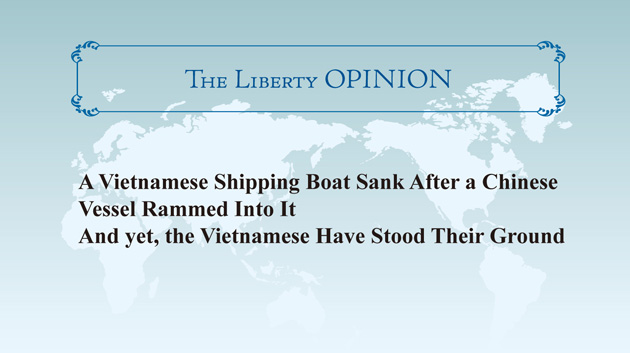A Vietnamese Shipping Boat Sank After a Chinese Vessel Rammed Into It And yet, the Vietnamese Have Stood Their Ground
A Vietnamese shipping boat sank after a Chinese fishing vessel crashed into it in the South China Sea.
The sinking occurred in the waters around the Paracel Islands off Vietnam. 40 Chinese vessels encircled the Vietnamese boat with only 10 fishermen on board before the Chinese rammed into it. Reporters claim that the ship’s body was damaged and ten fishermen were tossed into the water.
Other Vietnamese boats fortunately rescued all the crew, but in the disputed waters, 113 Chinese vessels and 40 Vietnamese vessels are still squaring off against each other, which could develop into a military clash if either side makes one wrong move.
China’s state-run oil company unilaterally began to drill in early May in the disputed waters. Vietnam claimed that the waters around the oil rig were within its exclusive economic zone, and sent its vessels in protest of China’s action. China deployed its vessels and used heavy-handed actions such as firing water cannons on and ramming into the Vietnam’s vessels.
As a result, some Vietnamese have been injured, which has flared anti-China protests across Vietnam. The sinking of this Vietnamese ship is likely to heighten tensions.
Given the circumstances, Vietnam has appeared unlikely to make concessionary gestures. Following China’s self-centered behavior since May, Deputy Colonel Ngo Ngoc of the Vietnamese Coast Guard said, “We will take all necessary measures to protect our sovereignty.” His comment showed that Vietnam has no intention of giving even an inch to China in this territorial dispute. The Vietnamese stance is quite a contrast to the 2010 Senkaku boat collision incident in which the Japanese reacted with weak-kneed response out of concern that the Chinese could take a tougher stance.
However, Vietnam is in a more disadvantageous position than Japan. It has a border with China, so it is always under the threat of attacks that the People’s Liberation Army could launch across its border at any time. Vietnam has poor defense capabilities compared to Japan’s Self-Defense Forces, and Vietnam cannot rely on the U.S, which was its enemy during the Vietnam War, in the interests of security. Vietnam is heavily dependent on China economically, because a good deal of Chinese capital has already entered Vietnam.
Vietnam is supposed to fear China much more than Japan, but it has adopted a hard-line stance. The reason is that Vietnam has experienced conflicts with China several times in the past. China’s control of the islands, which Vietnam claimed, developed into military clashes like the Sino-Vietnamese War in 1979.
Due to these circumstances, Vietnam has fully understood that even if it makes concessions to avoid provoking China, nothing will change. In fact, it will aggravate the situation. This has become obvious. The Vietnamese Prime Minister Nguen Tan Dung has said, “Vietnam will never barter its sacred sovereignty and legitimate interests for an unrealizable and conditional peace and friendship with China.”
Master Ryuho Okawa, the Founder and CEO of the Happy Science Group, gave a lecture titled “Love Shall Move This Era” on May 17th. In this public address, he commented on China’s provocative acts, “We need to understand that the Chinese people have a kind of culture in which they win when their opponents do not argue back.” China does not think that the international community will simply accept its claim to the Senkaku Islands and the islands in the South China Sea. It somewhat acts based on the idea that it wants to seize foreign territories, and if possible, demonstrate its military strength.
Japan should learn from Vietnam’s experience and consider what measures to take. At the same time, it should also strengthen its economic partnership with Vietnam and provide defensive support to step up patrols of the disputed waters.
Asian nations must make concerted efforts to protect the peace and maintain their security interests despite China’s threats.



















